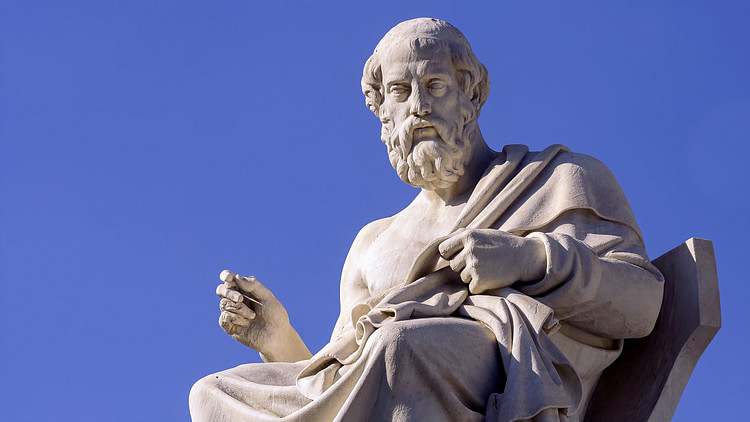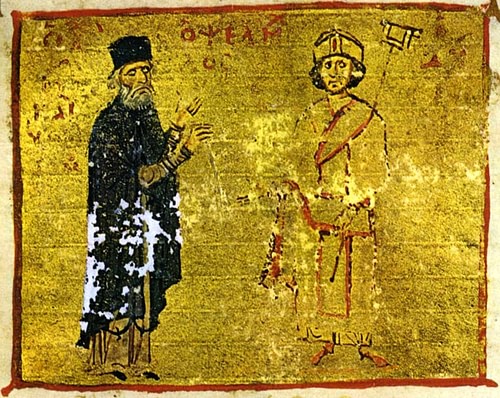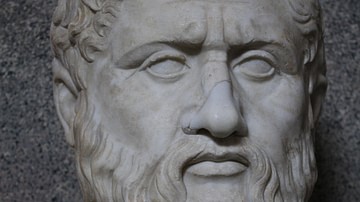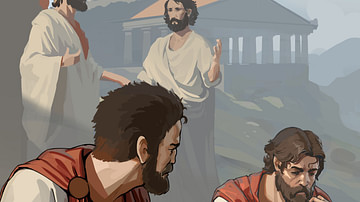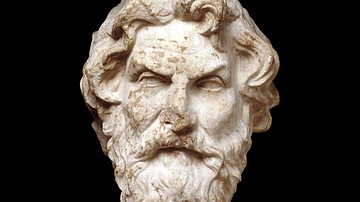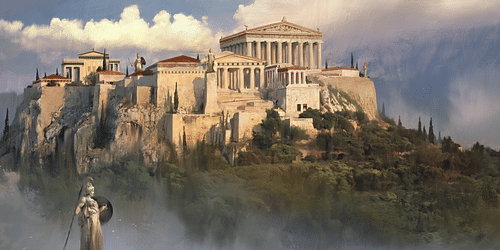
Proclus of Athens (c. 412-485 CE) was a prolific Platonic philosopher whose main aim was the seemingly impossible task of defending traditional Greek polytheism at the time when his contemporary culture was almost completely dominated by Christianity. He was the last significant pagan intellectual who spent his entire career providing a philosophical framework to Greek polytheism.
Although he was known as ‘Proclus of Athens’, Proclus was actually born in Constantinople, the capital city of the Byzantine Empire. He moved to Athens at the age of 18 to study at the Platonic Academy, a school founded by philosopher Plato in 387 BCE that preserved his tradition for 800 years. Proclus was very successful and became the head of the Academy. He kept this position for almost 50 years until his death.
Life & Education
Two sources tell us about the life of Proclus, namely, Life of Proclus: or On Happiness by Marinus (c. 440-500 CE), the devoted student and biographer of Proclus, and The Philosophical History by Damascus (c. 462-538 CE), the last leader of the Plato's Academy. However, like most ancient biographies, they present Proclus as a flawless figure. For this reason, these accounts should be treated with a pinch of salt. From Marinus, we learn that Proclus was born into a rich family of a lawyer in Constantinople. He studied initially to be a lawyer before deciding to study philosophy in Alexandria. According to Marinus upon receiving a message in a dream, he decided to pursue philosophy in Athens instead. In 430 or 431 CE, when he was only 18 years old, Proclus moved to Athens to study at the Platonic Academy.
At that time, Greek culture was almost completely dominated by Christianity, and paganism was gradually losing its importance. Paganism refers to the ancient Greek religion as portrayed in Greek mythology and works of Greek literature such as the Iliad and Odyssey by Homer, and Hesiod's Theogony, and the set of rituals and practices related to these myths. The time of Proclus was marked by the religious tumult: the temples and figures of the ancient Greek divinities in Athens were destroyed and pagans were persecuted by Christian authorities.
Three years after Proclus’ birth, a pagan philosopher Hypatia of Alexandria (c. 370 CE - March 415 CE) was killed by a mob in Alexandria. However, there were still some opposing voices that were not entirely silenced. This is evident in the fact that there were still prominent ancient philosophy schools in Alexandria and Athens serving as the intellectual centers at that time. Nevertheless, Christianity remained to be the dominant religion. There was an almost complete disappearance of the traditional Greek beliefs in the following centuries marked by the closing down of the last Platonic Academy by the Christian Emperor Justinian in 529 CE in Byzantium. As scholar Wildberg describes: "Pagan culture was under siege, and the old deities began to acknowledge defeat" (3).
Many Greek philosophers, especially those in the Athenian school, opposed this trend and did everything within their capacity to preserve paganism. Such was the religious climate when Proclus joined the Athenian school. This school was dominated by Neoplatonic teaching. Neoplatonism is the modern term to describe various thinkers in late antiquity starting from philosopher Plotinus (c. 204-270 CE) who attempted to preserve the thought of Plato. Proclus studied under the direction of some of the most prominent Neoplatonic philosophers of his time, such as Plutarch of Athens (c. 350-430 CE) and Syrianus (d. 437 CE).
Proclus held Syrianus’ teaching with great respect and never criticized him. He was also taught by a female philosopher Asclepigenia (c. 430-485 CE), who was Plutarch’s daughter. This was related to the fact that many Neoplatonist philosophers believed in equality between sexes when it came to education, ruling, and religion. Proclus himself wrote about the necessity of female education, and it was believed that he was under the special guidance of female divinities, such as Athena and Aphrodite. These teachers introduced him to a mystical interpretation of Plato and Aristotle.
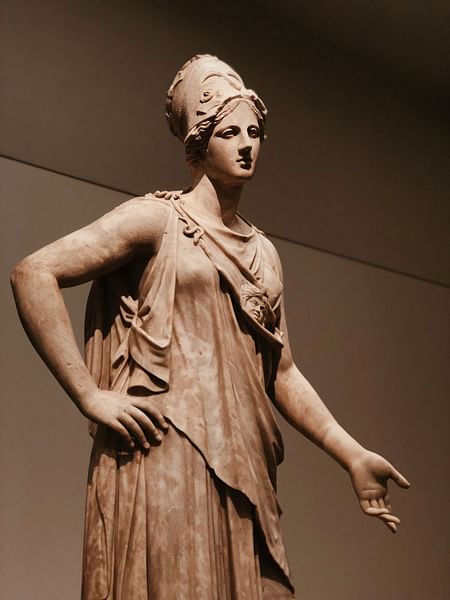
Proclus was also acquainted with various mystical religions, such as Orphism, a mystical cult associated with Orpheus, and the Chaldean Oracles, mystical texts that, together with Plato’s Timaeus, were the most important texts for Neoplatonic philosophers. His education conveys not only the simple education from the texts. Proclus was also initiated to the rituals (theurgy) that aimed to be the practical way of purifying one’s soul and attaining unity with the divine.
After the death of his teacher Syrianus, Proclus became the head of the Academy where he taught, wrote, and managed the entire school. He also participated in the social life of Athens, and it was reported that he cared a lot about his reputation. Despite his promotion of pagan philosophy, he was not a specific target of persecution by the Christian authorities. This is shown by the fact that he was allowed to run the Athenian school for 50 years without major difficulties. The only repercussion he suffered was his one-year exile. This exile was not very hard for him as he spent it on traveling and being further acquainted with various religious rituals. His day followed a strict and almost unchanged routine. He was said to be in good health and a vegetarian known for bathing in the ocean even at a very old age. After his death at 73, he was succeeded by Marinus.
Philosophical Works
Given his background and education, Proclus was determined to defend traditional Greek paganism. He believed that it could be done by creating an intellectual framework for traditional Greek beliefs. He was an extremely productive and versatile writer, and he could write around 700 lines every day. Proclus wrote numerous commentaries on the works of prominent figures of Greek philosophy, such as Plato, Aristotle, and Euclid. In these commentaries, he does not limit himself to merely repeating and analyzing their views but he also sought to enrich them with mystical writings such as the aforementioned Chaldean Oracles and Orphic texts. Although most of his commentaries were lost, Proclus is still considered to be one of the most comprehensive and systematic commentators on Plato.
According to Proclus, Platonic texts compose a single system, and Proclus believes that Plato never contradicted himself. Not only does Proclus systematize Plato’s works, but he also often interpreted them in such a way that he endorses the ancient Greek divinities. For example, in his Commentary on the Republic, a dialogue in which Plato discusses law, politics, and justice, Proclus uses the arguments of Plato on poetry to provide an intellectual justification of the importance and validity of Homer’s myths. In his commentaries on Timaeus, Proclus provides a comprehensive view of the divine hierarchy of the Greek pantheon. Here Proclus combines Platonic views on the creation of the universe and argues that it is consistent with Greek mythology.
Besides his commentaries, Proclus is also known for his elaborated metaphysics. Similar to Plotinus, Proclus holds that there is the One that is the first principle of the universe. In his major systematic works, such as Elements of Theology and Platonic Theology, he presents a detailed account on how everything proceeds from the One in an orderly way. As scholar Tarrant writes:
Proclus attempted to be even more systematic and ‘scientific’ than his predecessors, even when tackling subjects that we should not today think susceptible to scientific treatment, as in the Elements of Theology. (42)
Legacy
Despite Proclus’ intention to defend pagan deities, his work could not stop Christianity from ultimately overshadowing pre-existent beliefs completely. However, Proclus became a significant influence for Christian thinkers and theologians, especially those from the Byzantine Empire. These scholars used Proclus and other Platonic philosophers to justify Christian theology. For example, Pseudo-Dionysius of Areopagite (5th–6th century CE), a prominent Christian mystic, took many features of Proclus’ system to explain the hierarchy of angels.
Many lesser-known Christian scholars, such as Michael Psellos (c. 1018 - c. 1082), William of Moerbeke (c. 1215-1286), and Nicholas of Cusa (c. 1401-1464), studied Proclus’ thought. This allowed his thought to survive. In the 15th century, Proclus’ works were studied by Marsilio Ficino (1433-1499), a distinguished Platonic scholar. Ficino worked on the mystical interpretations of Plato and translated his dialogues into Italian. He used Proclus' commentary on Plato to write a Christian version of his Platonic Theology. Also, he used Proclus’ ideas on the immortality of the soul to justify Christian theology. However, it was not until the 19th century when Proclus’ ideas received significant attention through the work of Thomas Taylor (1758-1835), the English scholar who translated all of Proclus’ works into English. Nowadays, the most important contribution of his works is that they give us invaluable insights into the pagan philosophical and religious traditions of Late Antiquity.
Conclusion
Proclus devoted his entire life to the defense of Greek polytheism and the systematization of Platonic theology. He was arguably one of the last great pagan intellectuals whose works became a testament to the pre-Christian philosophical tradition in ancient Greece. Like many ancient philosophers, his system was employed by Christian thinkers who transformed his ideas into different forms. Wildberg summarizes Proclus’ work as follows:
Throughout his life, he put himself under enormous pressure to prevail in his pursuit of the best possible life, pouring his entire physical, intellectual, and spiritual energy into the resuscitation of a waning culture of intellectual and spiritual paganism. Even though he was in all likelihood in many ways "a difficult person", at once uncompromisingly demanding and egocentric, posterity owes him a lot. (20)

